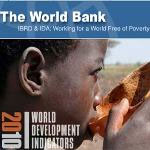
This is the VOA Special English Development Report.
The World Bank says most developing countries have made important progress toward the United Nations' Millennium Development Goals.
Last week the international lender released its yearly World Development Indicators. Hundreds of indicators are used to measure progress in areas such as education, health, poverty, the environment and trade.
One of the Millennium Development Goals is to reduce by half the number of people living in extreme poverty by 2015.
Out of 87 countries with data available, 49 seem likely to reach that goal. "Extreme poverty" is defined as earning less than one dollar a day.
Another goal is to make education available to all young children. The report shows that in 2007, seven out of ten children lived in developing countries that had met or were close to meeting that goal.
Also, 39 countries have achieved or are likely to achieve the goal of reducing child death rates. The target is a two-thirds reduction by 2015.
And the report from the World Bank shows the first reduction in AIDS-related deaths.
But even with all the progress, there is still a long way to go to reach all eight goals approved by world leaders ten years ago. This is especially true in sub-Saharan Africa, which falls behind on all of the goals.
Eric Swanson is a program manager for the World Development Indicators.
ERIC SWANSON: "You have had a decade or more in Africa of very slow economic progress in the 90s. You've had civil war and other disruptions, you've had poor governance in many countries that has not allowed the economy to grow and, in particular, has not allowed poor people to share in the benefits of growth."
Still, he points to some hopeful signs -- including a large reduction in the child death rate in Malawi.
ERIC SWANSON: "Malawi is a landlocked state, it is one of the ones that we tend to worry most about, and yet it has demonstrated that when you focus attention on a problem you can make progress."
Last week the World Bank also launched a new "open data initiative." The bank will make its data on living conditions around the world publicly available. Officials say this will make it easier to measure the effects of policies and develop new solutions to help the world's poor.
And that's the VOA Special English Development Report, written by June Simms. You can comment on our programs and learn about other development issues at voaspecialenglish.com. You can find transcripts, MP3s and podcasts. You can also follow us on Facebook, Twitter, YouTube and iTunes at VOA Learning English. I'm Steve Ember.
Fewer children dying in poor countries
UN leader warns of increasing world food demands
Kofi Annan says polluters must pay for climate change
(來源:VOA 編輯:陳丹妮)
